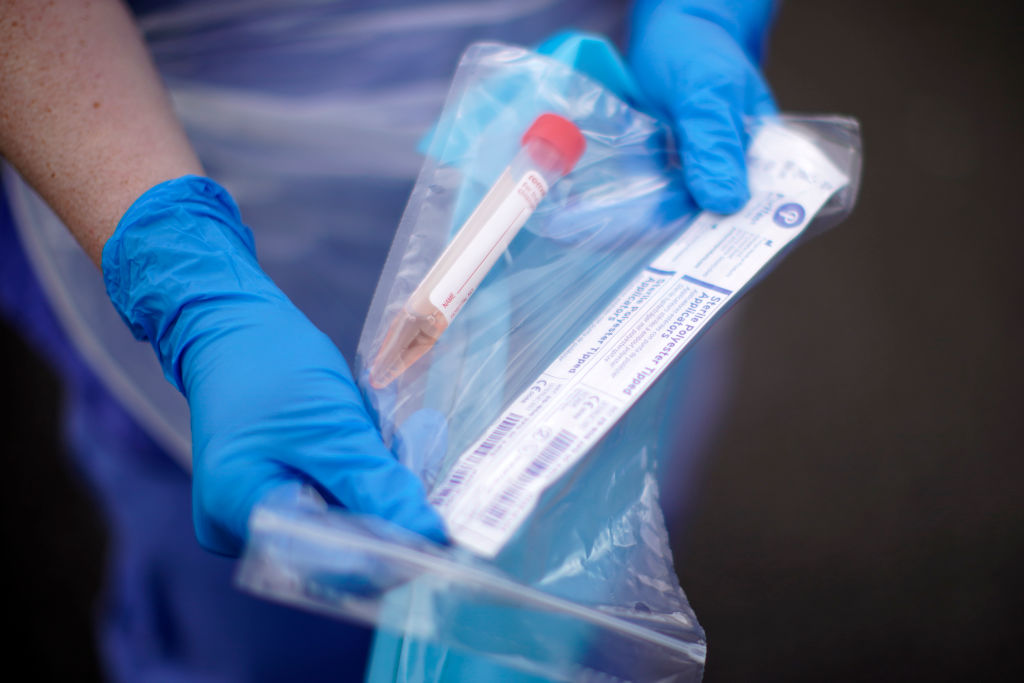Coronavirus testing has leveled off. Experts say it has to double before we can return to normalcy.


A free daily email with the biggest news stories of the day – and the best features from TheWeek.com
You are now subscribed
Your newsletter sign-up was successful
Coronavirus testing is one of the biggest things stopping the U.S. from reopening.
After weeks of continually upping its COVID-19 testing capacity, the U.S. seems to have hit a plateau of around 150,000 tests per day. President Trump and Republicans are still pushing to restart economic activity as soon as possible, but experts say the U.S. needs to at least double or triple its testing capacity before that can happen, NBC News reports.
The U.S. has had a severely limited COVID-19 testing capacity since the virus first appeared in the country. Tests are often limited to hospitalized patients, even though people can contract and spread the disease and show no symptoms, and hospitals have reported shortages in swabs and other supplies needed to conduct tests. As a result, only about 1 percent of the U.S. population has been tested, NBC News notes.
The Week
Escape your echo chamber. Get the facts behind the news, plus analysis from multiple perspectives.

Sign up for The Week's Free Newsletters
From our morning news briefing to a weekly Good News Newsletter, get the best of The Week delivered directly to your inbox.
From our morning news briefing to a weekly Good News Newsletter, get the best of The Week delivered directly to your inbox.
That dismal rate led Dr. Dan Hanfling, who worked in the National Healthcare Preparedness Program during the Obama and Trump administrations, to say "I don't think we're close" to being able to reopen the economy. Ashish Jha, director of the Harvard Global Health Institute, told Axios the U.S. needs to be performing 500,000 tests a day to consider reopening. Other experts tell NBC News that number should be more like millions or tens of millions of tests each day.
Without more tests, it won't be clear who can return to work and who needs to stay home longer, or where exactly the disease is spreading most rapidly — and that's to say nothing of coronavirus antibody tests that may paint a picture of resistance to the disease. Read more at NBC News.
A free daily email with the biggest news stories of the day – and the best features from TheWeek.com
Kathryn is a graduate of Syracuse University, with degrees in magazine journalism and information technology, along with hours to earn another degree after working at SU's independent paper The Daily Orange. She's currently recovering from a horse addiction while living in New York City, and likes to share her extremely dry sense of humor on Twitter.
-
 Political cartoons for February 16
Political cartoons for February 16Cartoons Monday’s political cartoons include President's Day, a valentine from the Epstein files, and more
-
 Regent Hong Kong: a tranquil haven with a prime waterfront spot
Regent Hong Kong: a tranquil haven with a prime waterfront spotThe Week Recommends The trendy hotel recently underwent an extensive two-year revamp
-
 The problem with diagnosing profound autism
The problem with diagnosing profound autismThe Explainer Experts are reconsidering the idea of autism as a spectrum, which could impact diagnoses and policy making for the condition
-
 Trump HHS slashes advised child vaccinations
Trump HHS slashes advised child vaccinationsSpeed Read In a widely condemned move, the CDC will now recommend that children get vaccinated against 11 communicable diseases, not 17
-
 FDA OKs generic abortion pill, riling the right
FDA OKs generic abortion pill, riling the rightSpeed Read The drug in question is a generic version of mifepristone, used to carry out two-thirds of US abortions
-
 RFK Jr. vaccine panel advises restricting MMRV shot
RFK Jr. vaccine panel advises restricting MMRV shotSpeed Read The committee voted to restrict access to a childhood vaccine against chickenpox
-
 Texas declares end to measles outbreak
Texas declares end to measles outbreakSpeed Read The vaccine-preventable disease is still spreading in neighboring states, Mexico and Canada
-
 RFK Jr. shuts down mRNA vaccine funding at agency
RFK Jr. shuts down mRNA vaccine funding at agencySpeed Read The decision canceled or modified 22 projects, primarily for work on vaccines and therapeutics for respiratory viruses
-
 Measles cases surge to 33-year high
Measles cases surge to 33-year highSpeed Read The infection was declared eliminated from the US in 2000 but has seen a resurgence amid vaccine hesitancy
-
 Kennedy's vaccine panel signals skepticism, change
Kennedy's vaccine panel signals skepticism, changeSpeed Read RFK Jr.'s new vaccine advisory board intends to make changes to the decades-old US immunization system
-
 Kennedy ousts entire CDC vaccine advisory panel
Kennedy ousts entire CDC vaccine advisory panelspeed read Health Secretary RFK Jr. is a longtime anti-vaccine activist who has criticized the panel of experts
